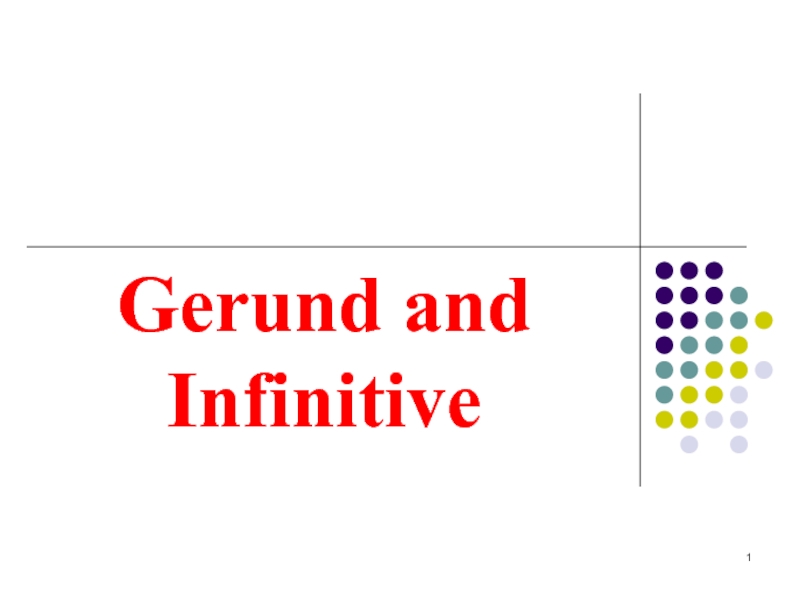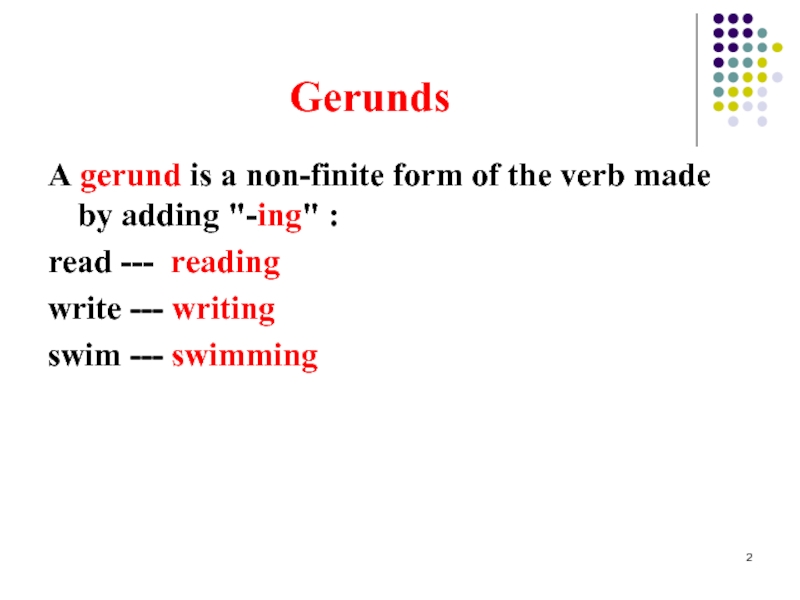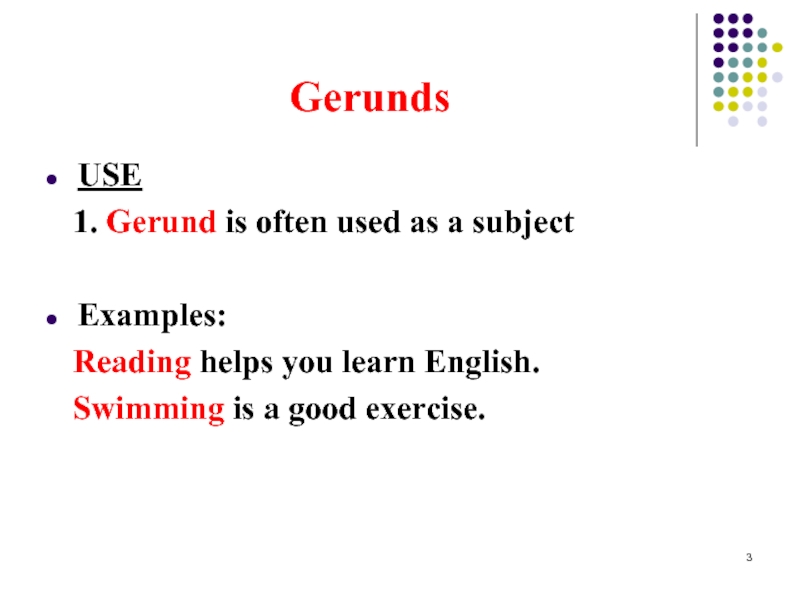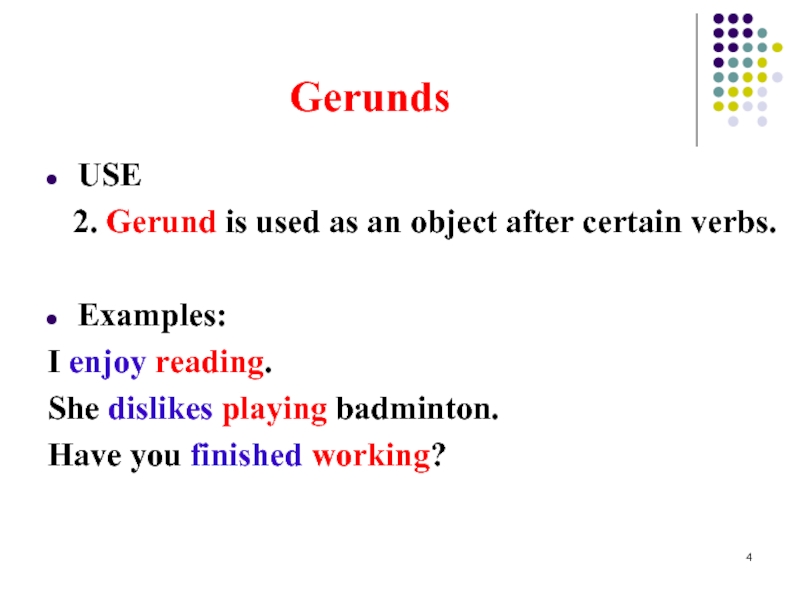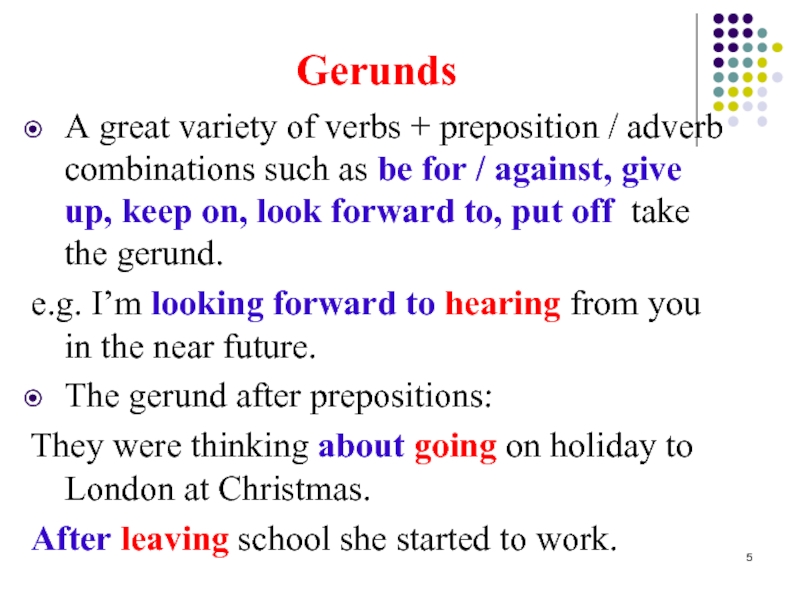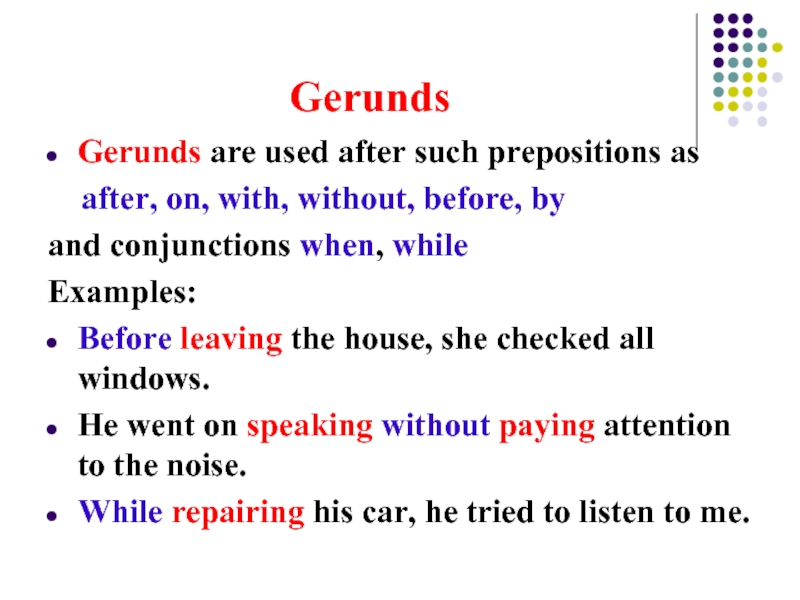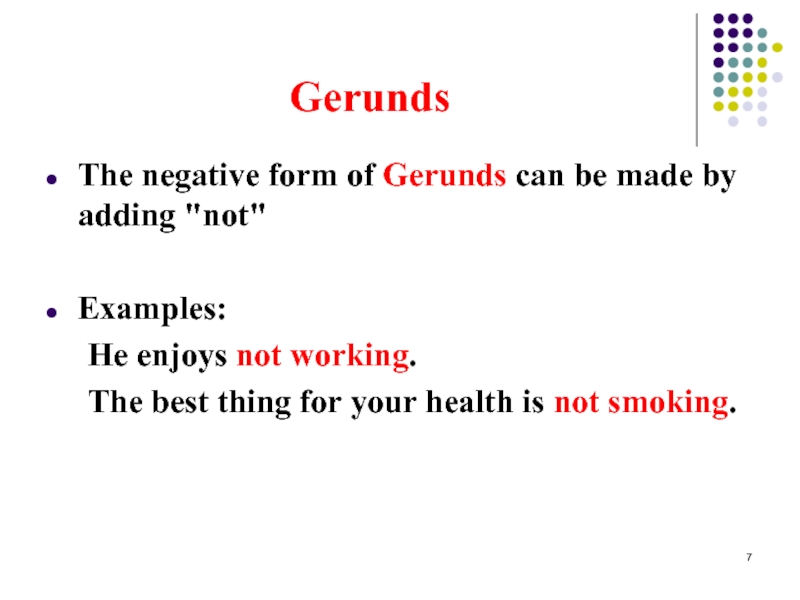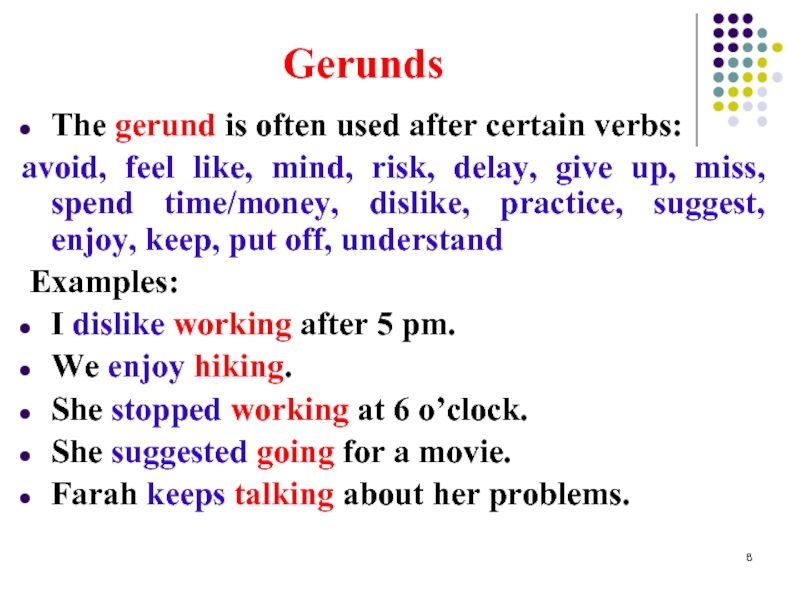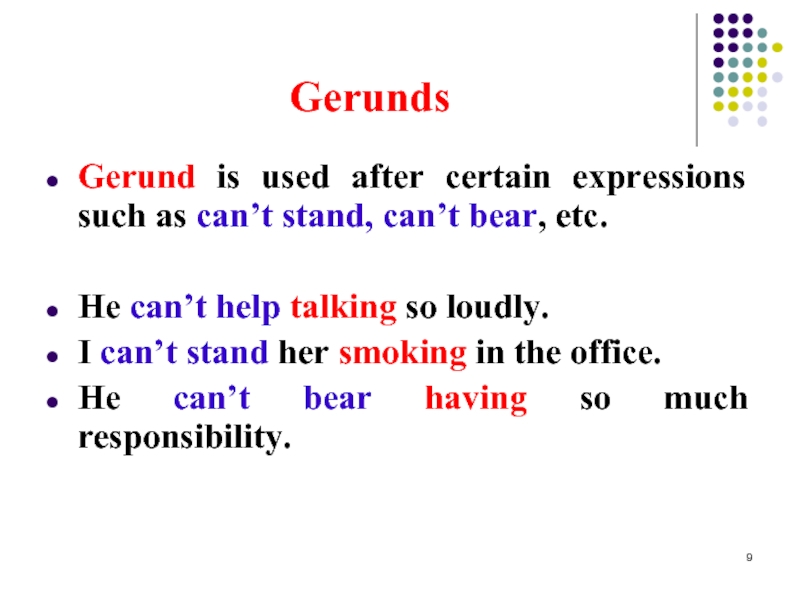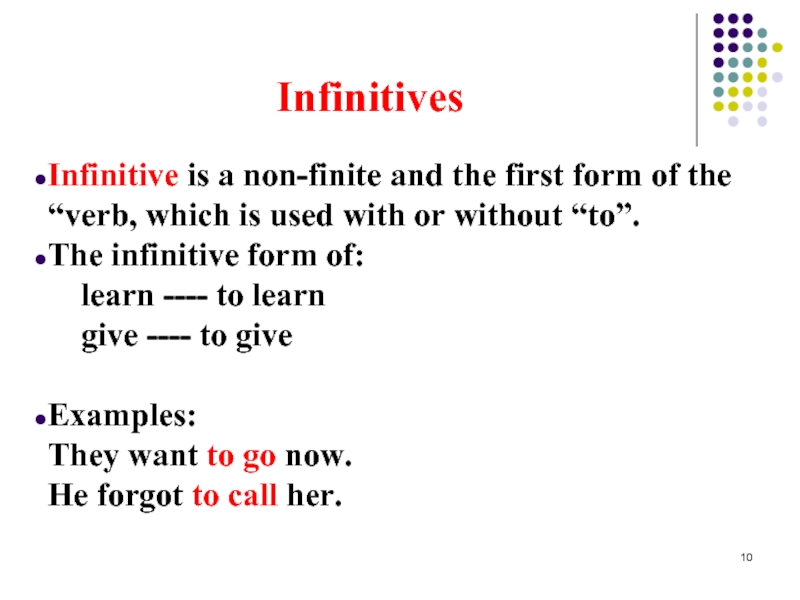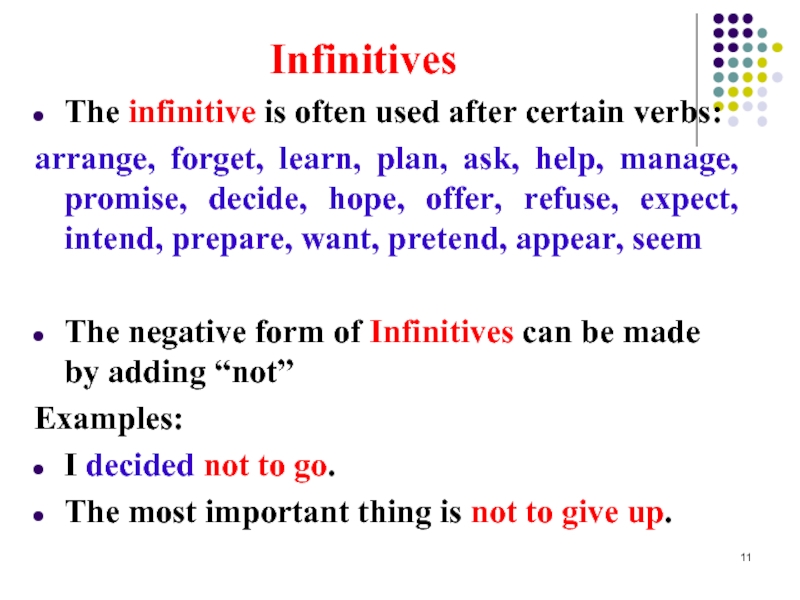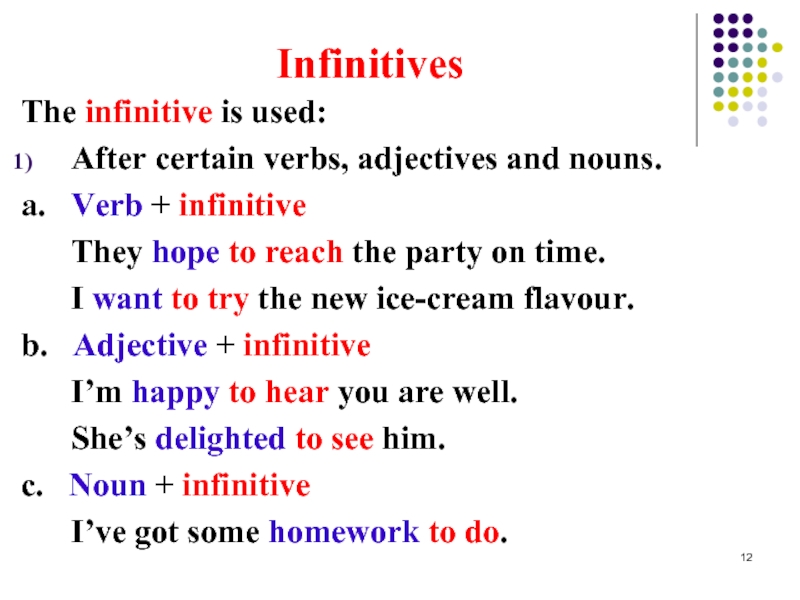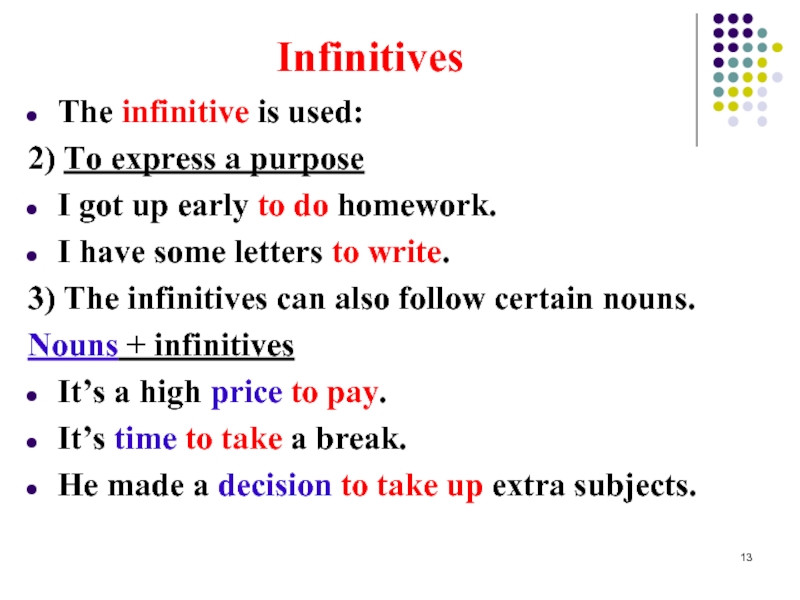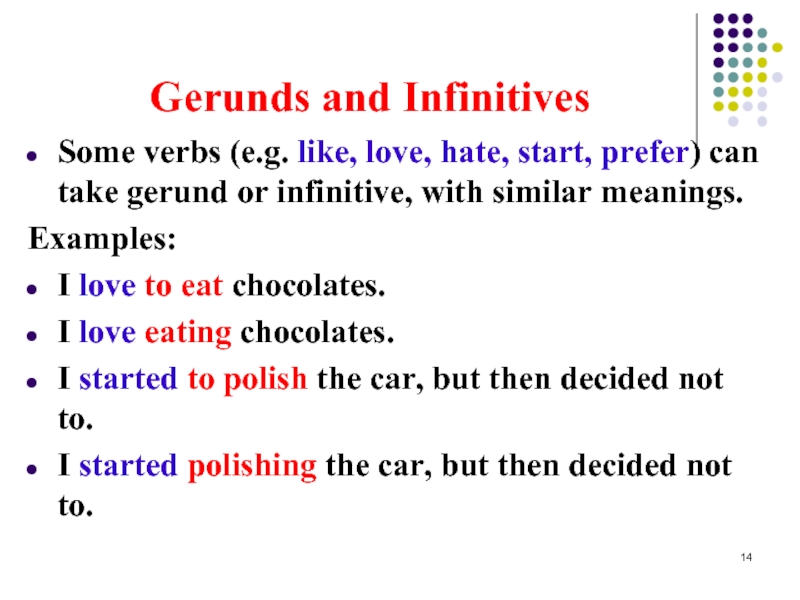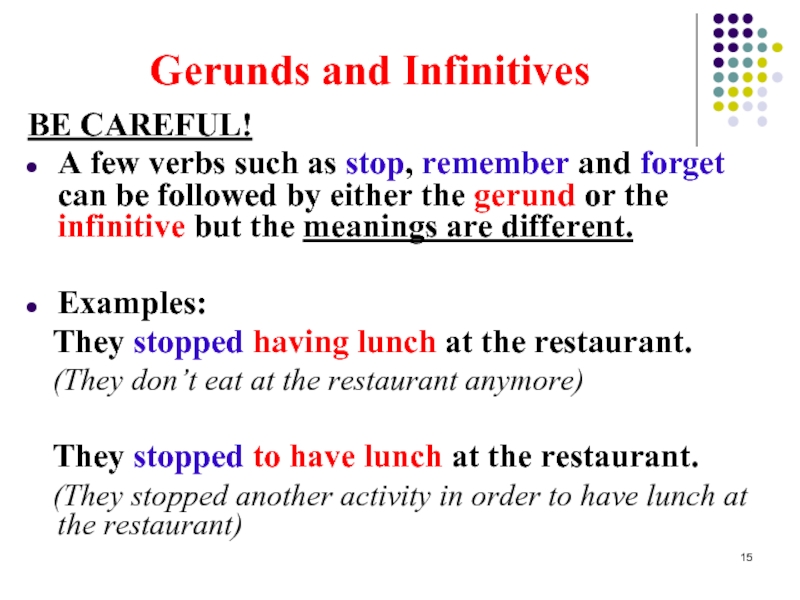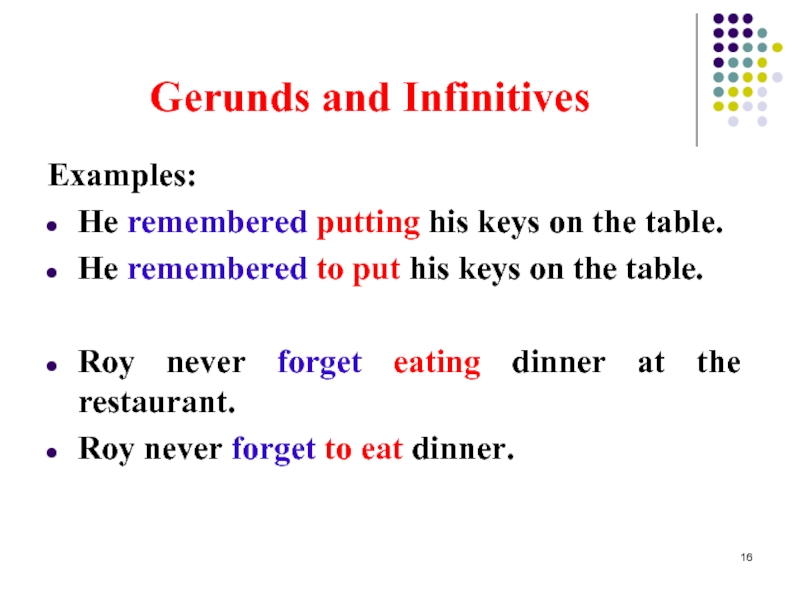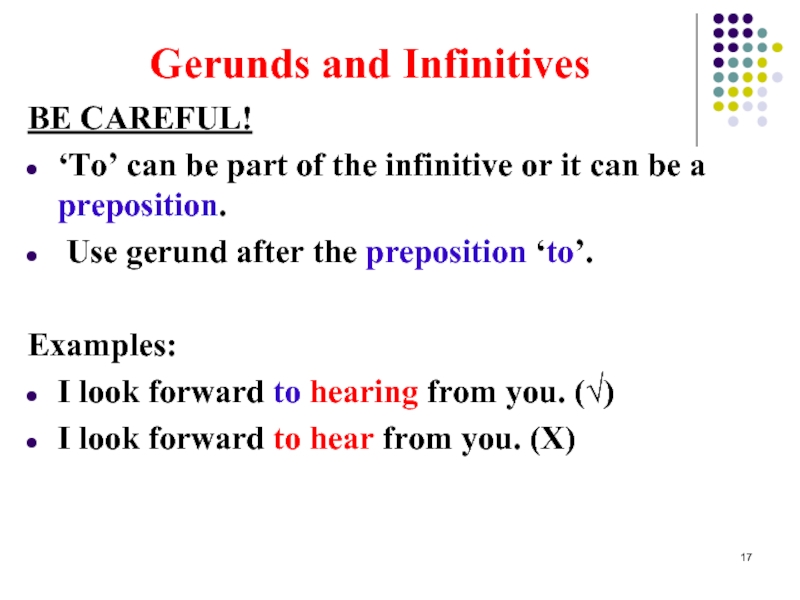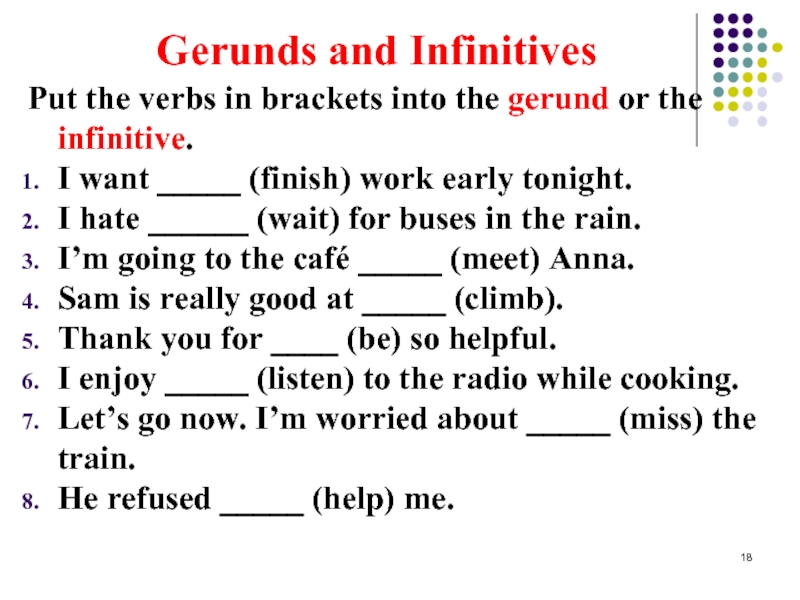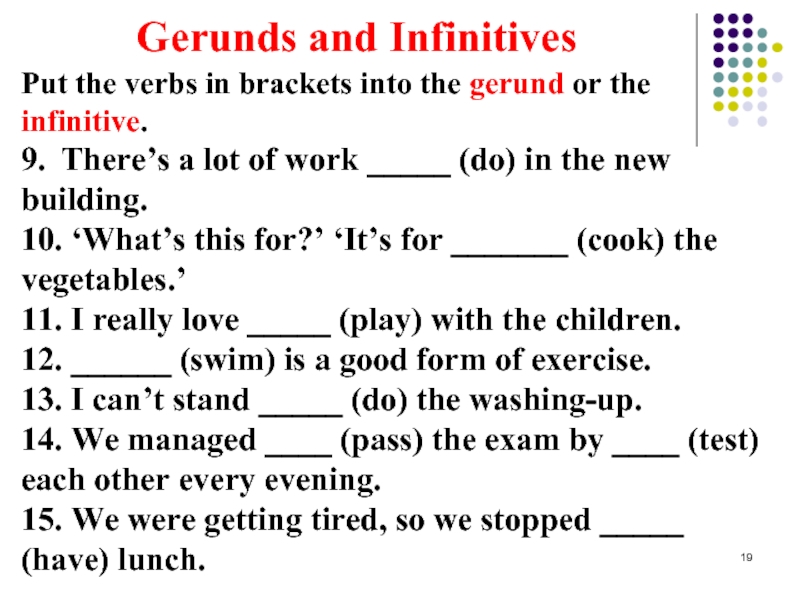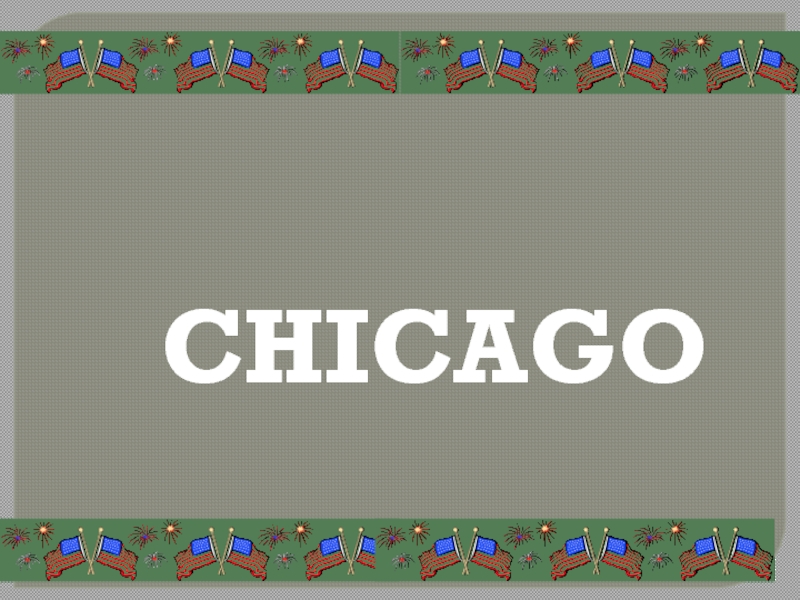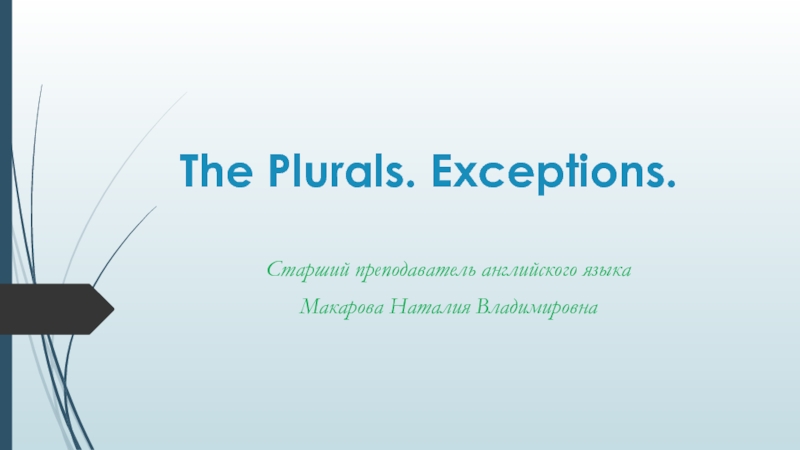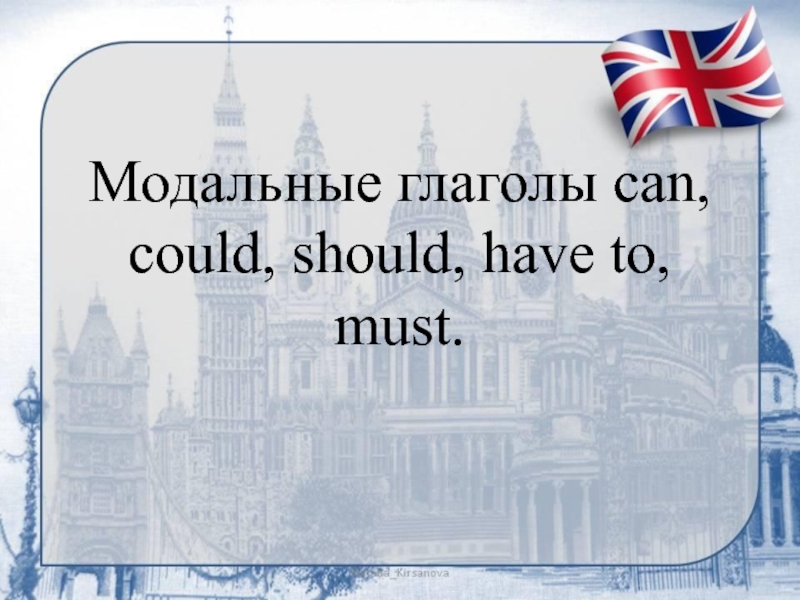- Главная
- Разное
- Дизайн
- Бизнес и предпринимательство
- Аналитика
- Образование
- Развлечения
- Красота и здоровье
- Финансы
- Государство
- Путешествия
- Спорт
- Недвижимость
- Армия
- Графика
- Культурология
- Еда и кулинария
- Лингвистика
- Английский язык
- Астрономия
- Алгебра
- Биология
- География
- Детские презентации
- Информатика
- История
- Литература
- Маркетинг
- Математика
- Медицина
- Менеджмент
- Музыка
- МХК
- Немецкий язык
- ОБЖ
- Обществознание
- Окружающий мир
- Педагогика
- Русский язык
- Технология
- Физика
- Философия
- Химия
- Шаблоны, картинки для презентаций
- Экология
- Экономика
- Юриспруденция
Gerund and Infinitive презентация
Содержание
- 1. Gerund and Infinitive
- 2. Gerunds A gerund is a non-finite form
- 3. Gerunds USE 1. Gerund is
- 4. Gerunds USE 2. Gerund
- 5. Gerunds A great variety of verbs +
- 6. Gerunds Gerunds are used after such prepositions
- 7. Gerunds The negative form of Gerunds can
- 8. Gerunds The gerund is often used after
- 9. Gerunds Gerund is used after certain expressions
- 10. Infinitives Infinitive is a non-finite and the
- 11. Infinitives The infinitive is often used after
- 12. Infinitives The infinitive is used: After certain
- 13. Infinitives The infinitive is used: 2) To
- 14. Gerunds and Infinitives Some verbs (e.g. like,
- 15. Gerunds and Infinitives BE CAREFUL! A few
- 16. Gerunds and Infinitives Examples: He remembered
- 17. Gerunds and Infinitives BE CAREFUL! ‘To’ can
- 18. Gerunds and Infinitives Put the verbs in
- 19. Gerunds and Infinitives Put the verbs in
Слайд 2Gerunds
A gerund is a non-finite form of the verb made by
adding "-ing" :
read --- reading
write --- writing
swim --- swimming
read --- reading
write --- writing
swim --- swimming
Слайд 3Gerunds
USE
1. Gerund is often used as a subject
Examples:
Reading helps you learn English.
Swimming is a good exercise.
Swimming is a good exercise.
Слайд 4Gerunds
USE
2. Gerund is used as an object after
certain verbs.
Examples:
I enjoy reading.
She dislikes playing badminton.
Have you finished working?
Examples:
I enjoy reading.
She dislikes playing badminton.
Have you finished working?
Слайд 5Gerunds
A great variety of verbs + preposition / adverb combinations such
as be for / against, give up, keep on, look forward to, put off take the gerund.
e.g. I’m looking forward to hearing from you in the near future.
The gerund after prepositions:
They were thinking about going on holiday to London at Christmas.
After leaving school she started to work.
e.g. I’m looking forward to hearing from you in the near future.
The gerund after prepositions:
They were thinking about going on holiday to London at Christmas.
After leaving school she started to work.
Слайд 6Gerunds
Gerunds are used after such prepositions as
after, on, with,
without, before, by
and conjunctions when, while
Examples:
Before leaving the house, she checked all windows.
He went on speaking without paying attention to the noise.
While repairing his car, he tried to listen to me.
and conjunctions when, while
Examples:
Before leaving the house, she checked all windows.
He went on speaking without paying attention to the noise.
While repairing his car, he tried to listen to me.
Слайд 7Gerunds
The negative form of Gerunds can be made by adding "not"
Examples:
He enjoys not working.
The best thing for your health is not smoking.
Слайд 8Gerunds
The gerund is often used after certain verbs:
avoid, feel like, mind,
risk, delay, give up, miss, spend time/money, dislike, practice, suggest, enjoy, keep, put off, understand
Examples:
I dislike working after 5 pm.
We enjoy hiking.
She stopped working at 6 o’clock.
She suggested going for a movie.
Farah keeps talking about her problems.
Examples:
I dislike working after 5 pm.
We enjoy hiking.
She stopped working at 6 o’clock.
She suggested going for a movie.
Farah keeps talking about her problems.
Слайд 9Gerunds
Gerund is used after certain expressions such as can’t stand, can’t
bear, etc.
He can’t help talking so loudly.
I can’t stand her smoking in the office.
He can’t bear having so much responsibility.
He can’t help talking so loudly.
I can’t stand her smoking in the office.
He can’t bear having so much responsibility.
Слайд 10Infinitives
Infinitive is a non-finite and the first form of the “verb,
which is used with or without “to”.
The infinitive form of:
learn ---- to learn
give ---- to give
Examples:
They want to go now.
He forgot to call her.
The infinitive form of:
learn ---- to learn
give ---- to give
Examples:
They want to go now.
He forgot to call her.
Слайд 11Infinitives
The infinitive is often used after certain verbs:
arrange, forget, learn, plan,
ask, help, manage, promise, decide, hope, offer, refuse, expect, intend, prepare, want, pretend, appear, seem
The negative form of Infinitives can be made by adding “not”
Examples:
I decided not to go.
The most important thing is not to give up.
The negative form of Infinitives can be made by adding “not”
Examples:
I decided not to go.
The most important thing is not to give up.
Слайд 12Infinitives
The infinitive is used:
After certain verbs, adjectives and nouns.
a. Verb
+ infinitive
They hope to reach the party on time.
I want to try the new ice-cream flavour.
b. Adjective + infinitive
I’m happy to hear you are well.
She’s delighted to see him.
c. Noun + infinitive
I’ve got some homework to do.
They hope to reach the party on time.
I want to try the new ice-cream flavour.
b. Adjective + infinitive
I’m happy to hear you are well.
She’s delighted to see him.
c. Noun + infinitive
I’ve got some homework to do.
Слайд 13Infinitives
The infinitive is used:
2) To express a purpose
I got up early
to do homework.
I have some letters to write.
3) The infinitives can also follow certain nouns.
Nouns + infinitives
It’s a high price to pay.
It’s time to take a break.
He made a decision to take up extra subjects.
I have some letters to write.
3) The infinitives can also follow certain nouns.
Nouns + infinitives
It’s a high price to pay.
It’s time to take a break.
He made a decision to take up extra subjects.
Слайд 14Gerunds and Infinitives
Some verbs (e.g. like, love, hate, start, prefer) can
take gerund or infinitive, with similar meanings.
Examples:
I love to eat chocolates.
I love eating chocolates.
I started to polish the car, but then decided not to.
I started polishing the car, but then decided not to.
Examples:
I love to eat chocolates.
I love eating chocolates.
I started to polish the car, but then decided not to.
I started polishing the car, but then decided not to.
Слайд 15Gerunds and Infinitives
BE CAREFUL!
A few verbs such as stop, remember and
forget can be followed by either the gerund or the infinitive but the meanings are different.
Examples:
They stopped having lunch at the restaurant.
(They don’t eat at the restaurant anymore)
They stopped to have lunch at the restaurant.
(They stopped another activity in order to have lunch at the restaurant)
Examples:
They stopped having lunch at the restaurant.
(They don’t eat at the restaurant anymore)
They stopped to have lunch at the restaurant.
(They stopped another activity in order to have lunch at the restaurant)
Слайд 16Gerunds and Infinitives
Examples:
He remembered putting his keys on the table.
He
remembered to put his keys on the table.
Roy never forget eating dinner at the restaurant.
Roy never forget to eat dinner.
Roy never forget eating dinner at the restaurant.
Roy never forget to eat dinner.
Слайд 17Gerunds and Infinitives
BE CAREFUL!
‘To’ can be part of the infinitive or
it can be a preposition.
Use gerund after the preposition ‘to’.
Examples:
I look forward to hearing from you. (√)
I look forward to hear from you. (X)
Use gerund after the preposition ‘to’.
Examples:
I look forward to hearing from you. (√)
I look forward to hear from you. (X)
Слайд 18Gerunds and Infinitives
Put the verbs in brackets into the gerund or
the infinitive.
I want _____ (finish) work early tonight.
I hate ______ (wait) for buses in the rain.
I’m going to the café _____ (meet) Anna.
Sam is really good at _____ (climb).
Thank you for ____ (be) so helpful.
I enjoy _____ (listen) to the radio while cooking.
Let’s go now. I’m worried about _____ (miss) the train.
He refused _____ (help) me.
I want _____ (finish) work early tonight.
I hate ______ (wait) for buses in the rain.
I’m going to the café _____ (meet) Anna.
Sam is really good at _____ (climb).
Thank you for ____ (be) so helpful.
I enjoy _____ (listen) to the radio while cooking.
Let’s go now. I’m worried about _____ (miss) the train.
He refused _____ (help) me.
Слайд 19Gerunds and Infinitives
Put the verbs in brackets into the gerund or
the infinitive.
9. There’s a lot of work _____ (do) in the new building.
10. ‘What’s this for?’ ‘It’s for _______ (cook) the vegetables.’
11. I really love _____ (play) with the children.
12. ______ (swim) is a good form of exercise.
13. I can’t stand _____ (do) the washing-up.
14. We managed ____ (pass) the exam by ____ (test) each other every evening.
15. We were getting tired, so we stopped _____ (have) lunch.
9. There’s a lot of work _____ (do) in the new building.
10. ‘What’s this for?’ ‘It’s for _______ (cook) the vegetables.’
11. I really love _____ (play) with the children.
12. ______ (swim) is a good form of exercise.
13. I can’t stand _____ (do) the washing-up.
14. We managed ____ (pass) the exam by ____ (test) each other every evening.
15. We were getting tired, so we stopped _____ (have) lunch.
